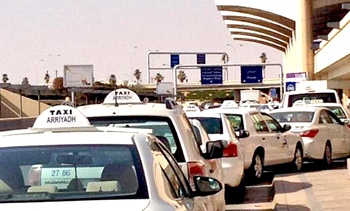 Jeddah, Nov 9: The Ministry of Transport has decided to implement new regulations for taxis, whether owned by individuals or firms, starting from mid-February.
Jeddah, Nov 9: The Ministry of Transport has decided to implement new regulations for taxis, whether owned by individuals or firms, starting from mid-February.
The new regulations involve extensive amendments, mainly insurance coverage to include third parties, the passengers and drivers through an insurance company licensed to operate in the Kingdom.
Also, vehicles must be equipped with GPS and automated tracking, and guiding systems linked with the headquarters of the facility in accordance with the terms and conditions issued by the ministry.
About one percent of the total number of cars operating under the facility’s management should be equipped with means to commute passengers using wheelchairs.Individuals may operate in this field of business after acquiring the necessary permits and in accordance with the conditions laid down in this regard.
The conditions stipulate that the vehicle must be owned and registered by the driver himself; however, exempted are cars funded and owned under the program of installments of firms offering taxi loans.
The driver must have a first-category driving license, and he should drive the vehicle himself.
The automobile liability insurance policy must cover third parties and passengers through an insurance company licensed to operate in the Kingdom.
The regulations allow firms and individuals to commute passengers from the city that issues the vehicle’s license to another city. Transporting the passengers must be done through taxi offices authorized to operate between cities, and the driver of the vehicle, on reaching the city of destination, should not operate his taxi in that city.
Such firms and individuals operating in the transport sector may transport passengers from airports, seaports, railways and public places. They should comply with the regulations and directions of the bodies of jurisdiction in this regard, including their required fee payments.
The regulations envisage that the driver must have first category driving license, should be able to read and write, in particular read road signs and maps.
The driver must produce a medical report stating he is free of infectious diseases.
Any facility operating a number of taxis must make its drivers follow a dress code (uniforms) after the approval of the ministry.
They should see to it that all drivers comply with the regulations; it becomes obligatory for them to fasten seatbelts for drivers and passengers in accordance with traffic regulations. The drivers must abstain from seeking clients, either by calling them or blowing the horn, or in any other manner that causes nuisance.
Drivers must also refrain from loading luggage other than hand baggage inside the car’s boot or passengers’ compartment. They should help passengers with special needs and elders to board the vehicle and alight from it.
Smoking is banned inside vehicles for both drivers and passengers; also drivers should not switch on their audiovisual equipment if disliked by the passengers.
The regulation also bans drivers from going about the streets in search of passengers. Passenger belongings left behind in the vehicles should be handed over by the drivers to their company executives who, in turn, should hand them to the nearest police station with a report stating the description of the items.
The life span of the vehicle in use should not be older than six years since its manufacture. The firm or individual operating the vehicle must install two identification boards — the first one should be installed in a place visible to the passenger in front and the other behind the driver’s seat for the passengers seated behind, in accordance with the directions and specifications adopted by the ministry.
The data displayed in the vehicle should include the authorized number to operate the vehicle, the number of the vehicle’s registration plate, the name of the individual or company owning the vehicle, the contact phone number, the name of the driver and their commitment to work under the regulations.
Also, details of social insurance and the directions of the Ministry of Labor related to employment of Saudi nationals and adherence to the Saudization ratio should also form part of the data on display.






Comments
Add new comment